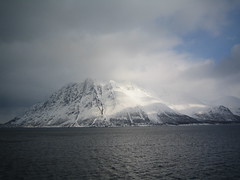 We’ve written often recently off the challenges soon to be faced by the continuing melt of the Arctic. Without a doubt, there are resources up there that someone will attempt to get their grubby little hands on. And, with the price of oil continuing to skyrocket with each passing month, if oil is found in the north – not an unexpected possibility considering the nearby reservoirs – all hell is going to break loose.
We’ve written often recently off the challenges soon to be faced by the continuing melt of the Arctic. Without a doubt, there are resources up there that someone will attempt to get their grubby little hands on. And, with the price of oil continuing to skyrocket with each passing month, if oil is found in the north – not an unexpected possibility considering the nearby reservoirs – all hell is going to break loose.
Scott Borgerson of the Council on Foreign Relations, a former U.S. Coast Guard lieutenant commander, has just gone on record as saying that we could be facing a new cold war.
The analogy is both apt and humorously fitting, but is it in any way true? Instead of the historic face-off between the world’s two superpowers, we could be looking at something far different. Instead of just America and Russia, Arctic powers include Canada, Denmark and Norway, in addition to the original two.
Already tensions are rising, in a way that is eerily familiar. Russia is sending submarines and science ships north to investigate how far their continental shelf extends. They’ve planted a flag on the seabed underneath the North Pole, and for the first time since the Cold War, they’ve sent strategic bomber flights over the Arctic.
And yet a US official, who went on record under anonymity, believes that “There’s no ice cold war.”
Borgerson said in a telephone interview recently that “…planting a flag on the sea bottom and renewing strategic bomber flights is provocative,” and added that “I don’t think we’re [the United States] scrambling. We’re sleepwalking … I think the Russians are scrambling and I think the Norwegians and Canadians and Danes are keenly aware.”
Everyone’s scrambling for the best view. Russia isn’t the only one conducting scientific research. All of the Arctic powers are looking at just how far their continental shelves reach. Russia seems to have stepped on toes, and while they aren’t necessarily in direct conflict with the US as of yet, Norway and Denmark definitely have some issues with what Russia is claiming as hers.
Coastal nations, like the 5 involved, are generally happy with the 200 nautical miles that extend from their coastline as sovereign territory. But recent research coming out of the University of New Hampshire and the U.S. National Oceanic and Atmospheric Administration suggests that the US shelf might extend an extra 100 nautical miles further than previously thought.
The U.N. Convention on the Law of the Sea is what gives the sovereign rights to coastal nations. And many believe that the US should sign the treaty soon. In addition, if a country can meet a set of conditions – scientific, etc – then their coastal boundaries can extend.
“Of course we need to be at the table as ocean law develops,” the U.S. official said. “It’s not like ocean law is going to stop developing if we’re not in there. It’s just going to develop without us.”
What saddens me the most is that you can get your bottom dollar that this does not bode well for the environment. Ask yourself what’s causing the melting of the Arctic, and then look at what they hope to extract. The answer to both questions, is fossil fuel.
Photo Courtesy of arcticroute.com via Flickr
I wrote a piece on this that has shown up in a couple of venues. I doubt Mr. Borgerson sees this, but sir, I apologize to you, I said Bergerson, not Borgerson in my piece. This artilce in Foreign Affairs is an outstanding read and highly suggested to all readers of Planetsave.
Sometimes Josh Hill gets on my last nerve. But my hat is off to you for this writing.
AJ.